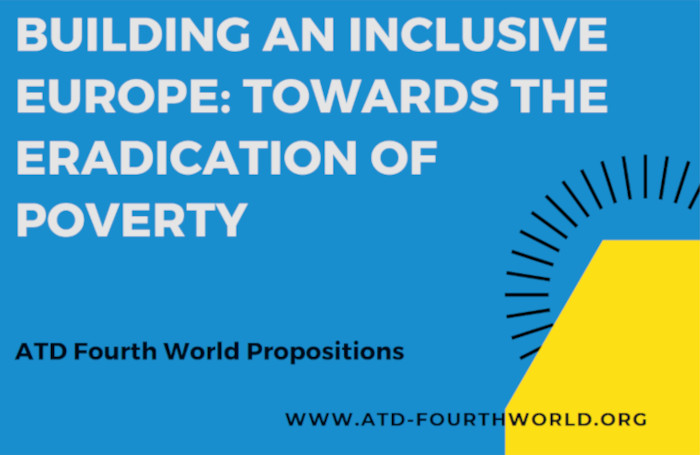Towards The Eradication Of Poverty

“What we’d like is for people to stop making decisions for us, to stop thinking for us, to stop doing things for us, and to do them with us”.
Angélique Jeanne, member of ATD Fourth World in Normandy, France, during the 15th European People‘s University at Parliament, February 6th 2019.
Extract from ATD Fourth World’s propositions for the European Union elections June 2024.
Inequalities in Europe
Inequalities in Europe are on the rise. According to Eurostat, in 2022, 95.3 million people lived in a situation of poverty or social exclusion in the European Union. This figure represents 21.6% of the population or one in five individuals1. Although these statistics are catastrophic in themselves, they are based on the criteria set by the European Union, such as level of income, severe social and material deprivation, and access to work within a household. Notably, they do not encompass other essential criteria that reflect poverty in all its dimensions, including institutional abuse and disempowerment2.
European Union pledge
The European Union has pledged to reduce the number of people at risk of poverty or social exclusion by 15 million by 2030 (including 5 million children)3. Today, not only is this target far from being achievable, it also leaves over 80 million people behind.
SDG1: “Eradicate poverty in all its forms, everywhere in the world”, and the goal of “Leaving no one behind”, which lies at the heart of the 2030 Agenda for Sustainable Development, cannot be regarded as mere positions of principle.
Current European and national policies are too far removed from the reality and needs of people living in poverty. Too many policies are geared towards short-term rather than long-term responses. To develop more effective policies, we believe that direct dialogue
between European decision-makers and people experiencing poverty is essential.
Experience and knowledge of those living in poverty
The experience and knowledge of those living in poverty must be valued and taken into account. This must be guaranteed by the implementation of permanent and adequately designed spaces for reflection and dialogue. It is vital to recognise people with this
experience as key political players in a democratic Europe that leaves no one behind.
The European institutions have a responsibility to develop ambitious initiatives to implement the principles enshrined in the European principles of social rights and to move towards the
complete eradication of poverty. European funds must provide the best possible support for these initiatives, aimed at a more inclusive and equitable European Union.
We invite each candidate to include in their programme for the European Union elections in June 2024 the following recommendations based on the works and preoccupations of the 150 local ATD Fourth World groups in Europe, and to make every effort to ensure their adoption and effective application once elected.
- Ensure the effective and meaningful participation of people living in poverty in the design, implementation, monitoring, and evaluation of all polices that may affect them, through institutionalised and appropriate mechanisms and processes
- Integrate a multidimensional and comprehensive approach to poverty within the framework of all relevant EU legislation, in line with SDG 1 (“End poverty in all its forms everywhere”).
- Acknowledge socio-economic discrimination in EU legislation
- Climate action must contribute to the eradication of poverty and access to fundamental human rights
- Guarantee the right to legal existence for all people living in European Union Member States throughout their lives.
- Guarantee and implement a minimum income scheme in all Member States to enable every citizen to secure a decent standard of living.
Read the complete ATD Fourth World propositions for the European Union elections of June 2024.

